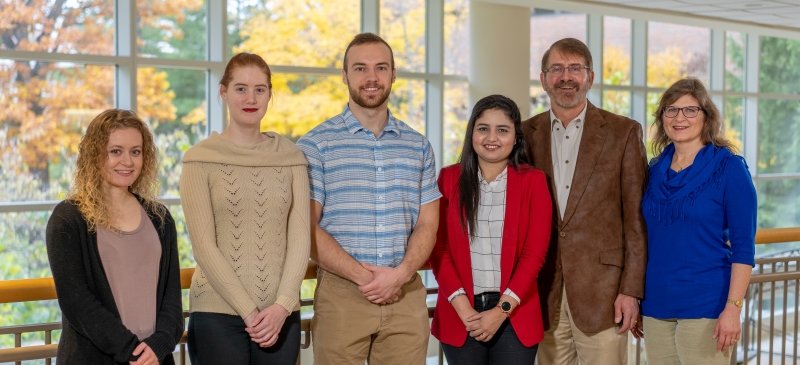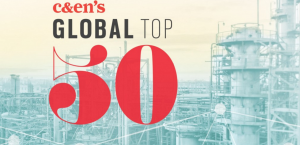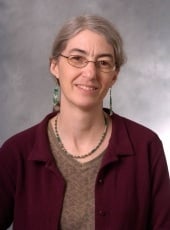Graduate students Wafa Mazi, Rashmi Adhiari, Shuai Xia, Mingxi Fang, research scientist Yibin Zhang, research assistant professor Momoko Tajiri, associate professors Rudy L. Luck, Ashutosh Tiwari, Marina Tanasova, and professor Haiying Liu published a paper titled “Fluorescent Probes with High pKa Values Based on Traditional, Near-infrared Rhodamine, and Hemicyanine Fluorophores for Sensitive Detection of Lysosomal pH Variations” in Methods on July 22, 2019.
 Marina Tanasova (Chemistry) is Principal Investigator on a project that has received a $446,849 research and development grant from the U.S. Department of Health and Human Services—National Institutes of Health. The project is titled ” Exploiting Cellular Discrimination Through GLUTs With Small-Molecule GLUT-Targeting Probes.” Smitha Rao (Biomed Engineering) is the Co-PI on this potential three-year project.
Marina Tanasova (Chemistry) is Principal Investigator on a project that has received a $446,849 research and development grant from the U.S. Department of Health and Human Services—National Institutes of Health. The project is titled ” Exploiting Cellular Discrimination Through GLUTs With Small-Molecule GLUT-Targeting Probes.” Smitha Rao (Biomed Engineering) is the Co-PI on this potential three-year project.

Haiying Liu (Chem) is Principal Investigator on a project that has received a $459,000 award (Award Number 2R15GM114751-02) from the National Institute of General Medical Sciences of the National Institutes of Health. This new grant is based on a renewal proposal titled “Ratiometric Near-infrared Fluorescent Probes for Sensitive Detection of Lysosomal and Mitochondrial pH changes in Live Cells.” Ashutosh Tiwari (Chem) is Co-PI in this project.
Sarah Green (Chem) has been in Nairobi, Kenya for the launch of the Sixth Global Environmental Outlook (GEO-6) at the United Nations Environmental Assembly (UNEA).

Matthew Songer, (Biological Sciences ’79) and Laura Songer (Biological Sciences ’80) have generously donated funds to the College of Sciences and Arts (CSA) to support a research project competition for undergraduate and graduate students. Remembering their own eagerness to engage in research during their undergraduate years, the Songers established these awards to stimulate and encourage opportunities for original research by current Michigan Tech students. The College is extremely grateful for the Songers’ continuing interest in, and support of, Michigan Tech’s programs in human health and medicine. This is the second year of the competition.
Students may propose an innovative medically-oriented research project in any area of human health. The best projects will demonstrate the potential to have broad impact on improving human life. This research will be pursued in consultation with faculty members within the College of Sciences and Arts. In the Spring of 2019, the Songer’s gift will support one award for undergraduate research ($4,000) and a second award for graduate research ($6,000). Matching funds from the College may allow two additional awards.
Any Michigan Tech student interested in exploring a medically related question under the guidance of faculty in the College of Sciences and Arts may apply. Students majoring in any degree program in the college, including both traditional (i.e., biological sciences, kinesiology, chemistry) and nontraditional (i.e., physics, psychology, social science, bioethics, computer science, mathematics) programs related to human health may propose research projects connected to human health. Students are encouraged to propose original, stand-alone projects with expected durations of 6 – 12 months. The committee also encourages applications from CSA students who seek to continue research projects initiated through other campus mechanisms, such as the Summer Undergraduate Research Fellowship (SURF) program, Pavlis Honors College activities or the Graduate Research Forum (GRF).
Funds from a Songer Award may be used to purchase or acquire research materials and equipment needed to perform the proposed research project. Access to and research time utilizing University core research facilities, including computing, may be supported. Requests to acquire a personal computer will be scrutinized and must be fully justified. Page charges for publications also may be covered with award funds, as will travel to appropriate academic meetings. This award may not be used for salary or compensation for the student or consulting faculty.
To apply:
- Students should prepare a research project statement (up to five pages in length) that describes the background, methods to be used, and research objectives. The statement also should provide a detailed description of the experiments planned and expected outcomes. Students must indicate where they will carry out their project and attach a separate list of references/citations to relevant scientific literature.
- The application package also should provide a concise title and brief summary (1 page) written for lay audiences.
- A separate budget page should indicate how funds will be used.
- A short letter from a consulting faculty member must verify that the student defined an original project and was the primary author of the proposal. The faculty member should also confirm her/his willingness to oversee the project. This faculty letter is not intended to serve as a recommendation on behalf of the student’s project.
Submit applications as a single PDF file to the Office of the College of Sciences and Arts by 4:00 p.m. Monday, April 22. Applications may be emailed to djhemmer@mtu.edu.
The selection committee will consist of Matthew Songer, Laura Songer, Shekhar Joshi (BioSci) and Megan Frost (KIP). The committee will review undergraduate and graduate proposals separately and will seek additional comments about the proposed research on an ad-hoc basis from reviewers familiar with the topic of the research proposal. Primary review criteria will be the originality and potential impact of the proposed study, as well as its feasibility and appropriateness for Michigan Tech’s facilities.
The committee expects to announce the recipients by early May of 2019. This one-time research award will be administered by the faculty advisor of the successful student investigator. Students will be expected to secure any necessary IRB approval before funds will be released. Funds must be expended by the end of spring semester 2020; extensions will not be granted. Recipients must submit a detailed report to the selection committee, including a description of results and an accounting of finds utilized, no later than June 30, 2020.
Any questions may be directed to Megan Frost (mcfrost@mtu.edu), David Hemmer (djhemmer@mtu.edu) or Shekhar Joshi (cpjoshi@mtu.edu).
 Light-absorbing brown carbon aerosols, emitted by wildfires, remain longer in the atmosphere than expected, which could have implications for climate predictions. Graduate student, Simeon Schum, and researchers Lynn Mazzoleni and Claudio Mazzoleni discuss research on lingering effects of aerosols in Michigan Tech News
Light-absorbing brown carbon aerosols, emitted by wildfires, remain longer in the atmosphere than expected, which could have implications for climate predictions. Graduate student, Simeon Schum, and researchers Lynn Mazzoleni and Claudio Mazzoleni discuss research on lingering effects of aerosols in Michigan Tech News
Claudio Mazzoleni (Physics), Lynn Mazzoleni (Chem) and graduate student Simeon Schum were featured in the article “Aerosol problem: Adding a piece to the climate change puzzle,” in the Daily Mining Gazette.
 Stream gauges in the Keweenaw help us understand ecosystems and prepare our communities for flooding—but their existence is in jeopardy.
Stream gauges in the Keweenaw help us understand ecosystems and prepare our communities for flooding—but their existence is in jeopardy.
One of the most basic characteristics used to describe a stream is how much water it carries—the flow, or more accurately, discharge—which is measured in units of volume per time (typically cubic feet or cubic meters per second). Understanding how river discharge changes with time tells us important information about the stream, including how quickly something that is added to the river will be diluted and moved downstream. A river’s discharge rate also tells us how prone the river is to disturbances and what conditions the organisms that live there experience.
Understanding the river flow is also key for human communities. It allows planning for how quickly we can expect lakes and reservoirs to fill and how much water can be withdrawn for irrigation or drinking.
River flow also helps communities prepare for potential natural disasters, such as understanding how likely a river is to overflow its banks to cause a flood, and how to build culverts and bridges to withstand a flood like the one that Houghton experienced in June.
Read the full story on Unscripted.
We are happy to announce chemistry grad students Mingxi Fang and Xin Yan are among the winners for the Doctoral Finishing Fellowship Award. Congratulations!
Finishing Fellowships provide support to PhD candidates who are close to completing their degrees. These fellowships are available through the generosity of alumni and friends of the University. They are intended to recognize outstanding PhD candidates who are in need of financial support to finish their degrees and are also contributing to the attainment of goals outlined in The Michigan Tech Plan.
 According to a recent article in C&EN, the world wide, the chemical industry looks to be very healthy, with combined sales increasing by over 12% in 2017 over the prior year for its list of Global Top 50 chemical companies.
According to a recent article in C&EN, the world wide, the chemical industry looks to be very healthy, with combined sales increasing by over 12% in 2017 over the prior year for its list of Global Top 50 chemical companies.
